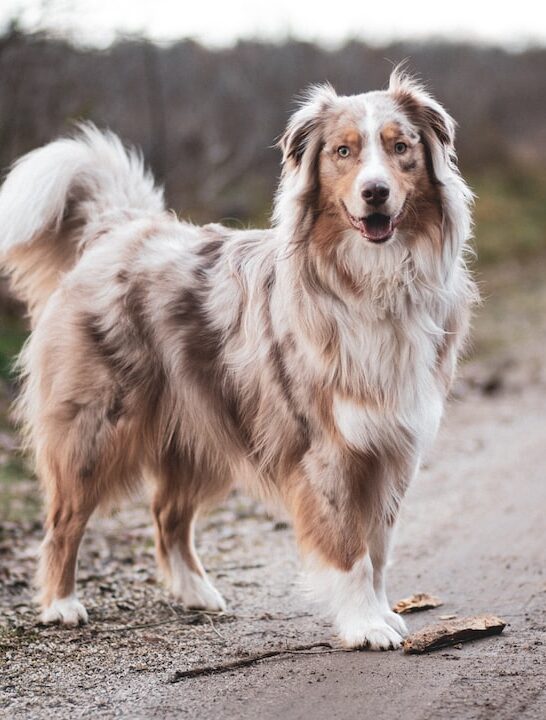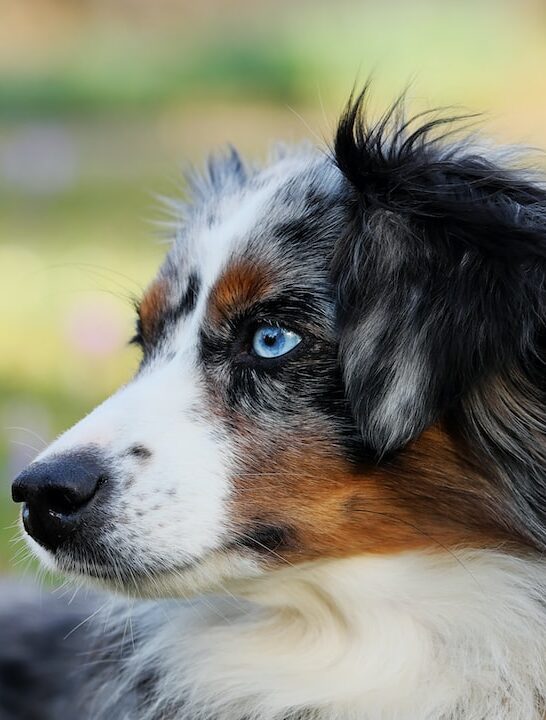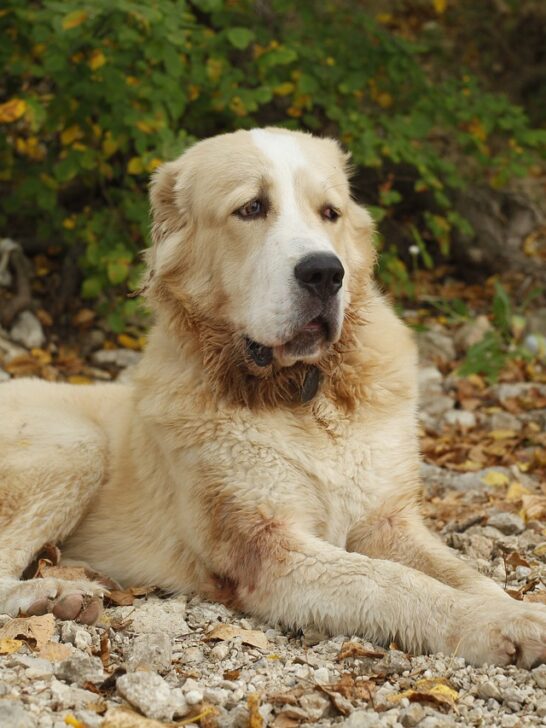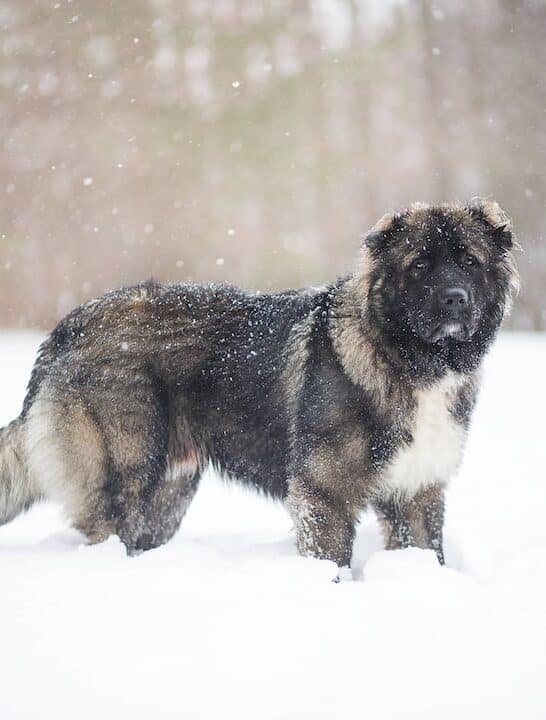Caring for Your Black German Shepherd
Black German Shepherds are a unique and stunning variation of the beloved German Shepherd breed. Contrary to popular belief, these beautiful dogs aren’t the product of cross-breeding. Instead, they are recognized as part of the breed standard.
However, despite being an accepted variant, Black German Shepherds are relatively rare.
As both a guardian and family member, the Black Shepherd deserves the best care and attention. Specific grooming techniques, routines, and health considerations are essential for their health.
This article will help you provide the best care for your Black GSD. It covers everything you need to know about this breed, from grooming and training techniques to nutrition and health.
Key Takeaways
- Getting a Black German Shepherd is a great choice due to their admirable traits and extensive working abilities.
- Black German Shepherds exhibit loyalty, intelligence, and versatility.
- Caring for a Black German Shepherd involves regular grooming to maintain their luxurious coat and prevent matting.
- Black German Shepherds tend to have some health issues, such as hip dysplasia.
- To provide optimal nutrition for Black German Shepherds, follow appropriate feeding guidelines. Feed them meals at regular intervals, and always provide fresh and clean water.
History of the Black German Shepherd
The Black German Shepherd is not a separate breed from the standard German Shepherd. In fact, the history of the black version is intertwined with that of the German Shepherd breed as a whole.
Originally developed in Germany during the late 19th and early 20th centuries, the GSD was bred as a working dog to protect livestock. Over time, various coat colors emerged within the breed, including black.
While these solid black dogs have always existed, they were not as popular as the black and tan German Shepherd due to breed standards. Even so, the unique appearance of Black German Shepherds, along with their admirable working abilities, easily won people’s hearts.
Today, Black German Shepherds continue to be precious companions, loyal protectors, and valuable working dogs worldwide.
What Is a Black German Shepherd?
Black German Shepherds are purebred German Shepherds with solid black coats. Their double coat provides insulation and protection against harsh weather conditions, making them well-suited for any environment.
Breeding
Producing a black German Shepherd isn’t just about luck. It’s rooted in the science of canine genetics.
Both parental dogs play a pivotal role in determining the puppy’s coat color. They must carry some specific genes, known as recessive genes.
Recessive genes are those that typically remain hidden. They are overshadowed by what we call dominant genes.
However, when both parents carry the same recessive genes, they can manifest in the offspring — in this case, resulting in a black coat color.
Characteristics
Black German Shepherds share all the characteristics of their black-and-tan counterparts. They are intelligent, loyal, and flexible working dogs that excel in various roles.
One of the key traits of Black German Shepherds is their protective nature. This quality makes them fantastic guard dogs. They are always ready to shield their territories and families from potential harm.
Loyalty is another unmistakable trait of a Black German Shepherd. They unwaveringly love and defend their human families, standing by them even during difficult times.
Lastly, these dogs epitomize intelligence. Not only are they quick learners, but they can also perform complex tasks. It contributes to their high status as working dogs. Thanks to their keen intellect, they are easy to train and work with.
Why Should You Get a Black German Shepherd?
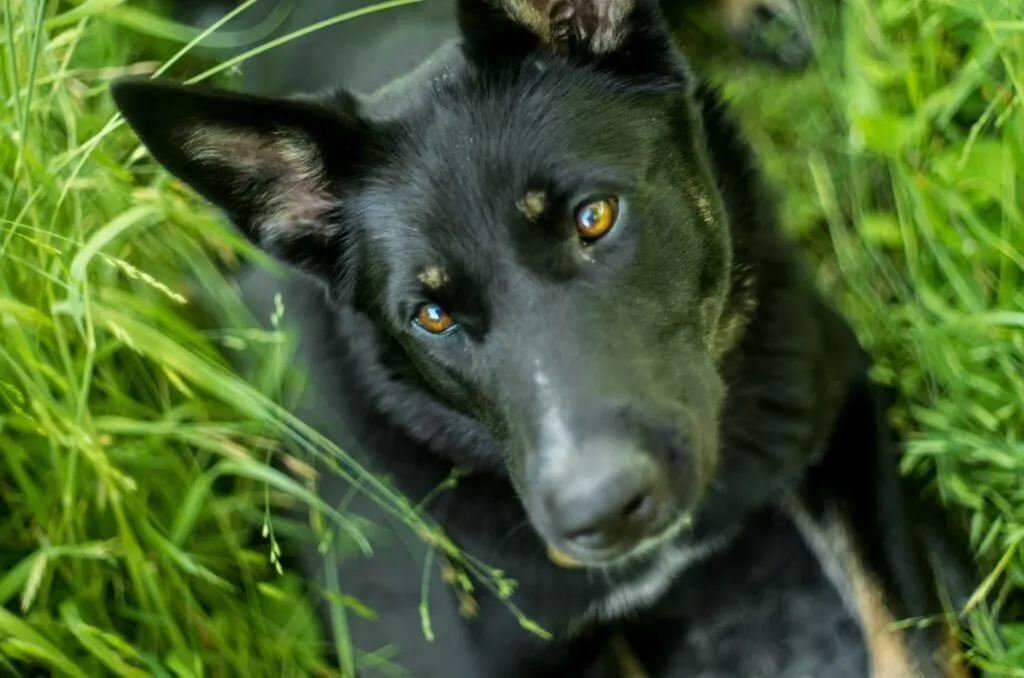
Admirable Traits
German Shepherds have earned their reputation as one of the most popular dog breeds in the world, and it’s easy to see why!
As mentioned above, Black German Shepherds are loyal, affectionate, and protective dogs. Their loyalty is unwavering, as they form strong bonds with their owners and are dedicated to serving their families.
These dogs often seek attention, hugs, and cuddles from their loved ones.
Additionally, their protective nature makes them excellent guard dogs. They are instinctively wired to alert their owners of any potential threats or dangers.
Long Lifespan
Black German Shepherds live for many years, with an average lifespan of 9 to 13 years. It makes them excellent family dogs, as they can be part of your family for a long time.
These energetic bundles of joy require regular exercise and mental stimulation. But they can also be calm and gentle when needed, making them suitable for families with children.
Working Abilities and Role
The American Kennel Club considers the German Shepherd the finest all-purpose working dog among all dog breeds.
Black German Shepherds are no different! With their intelligence, trainability, and strong work ethic, these dogs excel in various roles, such as police work, search and rescue missions, and service tasks.
Their natural instincts as herding dogs also make them skilled in guiding and controlling livestock, making them a must-have companion on farms and ranches.
How to Properly Care for the Black German Shepherd Breed?
Grooming Your German Shepherd
Grooming plays a crucial role in maintaining the health and appearance of your Black German Shepherd’s coat. Their black coat requires regular brushing to remove loose fur and prevent matting.
At the same time, their ears should be checked weekly for signs of infection, and their nails should be trimmed regularly to avoid discomfort and injury.
It’s worth noting that Regular German Shepherds are known to shed heavily, and Black German Shepherds are no exception. Regular grooming sessions can minimize shedding and keep your German Shepherd looking neat and sharp. It will also help your home remain free from excessive hair.
Exercise and Training for Black German Shepherds
Black German Shepherds are highly active dogs that require regular exercise to stay mentally and physically stimulated. Daily walks, along with interactive playtime and training sessions, are essential for their well-being.
You can engage your large dog’s intelligent mind through obedience training and interactive toys. It’s an excellent method to prevent boredom and destructive behavior.
Training should start from a young age to establish a strong bond. Black German Shepherds are known for their eagerness to please, making them relatively easy to train.
Consistency, positive reinforcement, and socialization in different environments are key factors in raising a well-rounded and obedient Black German Shepherd.
Proper Nutrition for Black German Shepherds
Black German Shepherds are large breed dogs with specific dietary needs.
Here’s everything you need to know about their nutritional requirements to keep them healthy and happy.
Adult Black German Shepherd
Adult Shepherds need a lot of protein for muscle maintenance and overall health. Search for large-breed dog foods that have real meat as the primary ingredient.
Ideally, the food should contain a good balance of fats, carbohydrates, vitamins, and minerals. This combination of ingredients will support your dog’s energy levels, joint health, and immune system.
Fruits and vegetables like bananas, carrots, green beans, and blueberries can help round out your dog’s diet.
Black German Shepherd Puppy
Black German Shepherd pups highly benefit from all-natural and specially formulated puppy foods. These foods are designed to support their specific nutritional needs during their rapid growth and development stage.
For best results, look for puppy food that contains essential nutrients. These include high-quality protein, omega-3 fatty acids (DHA), calcium, and phosphorus.
Providing your puppy with this food will promote muscle, brain, and eye development, as well as strong bones and teeth.
Choose dog foods from a reputable brand designed for large-breed dogs.
It’s also crucial to follow the feeding guidelines provided on the packaging and consult with a veterinarian to ensure you give the right amount and type of food for your Black German Shepherd.
Feeding Guidelines for Black German Shepherds
Feeding Frequency
To keep your Black German Shepherd healthy and maintain good digestion, establish a regular feeding schedule.
Instead of providing one large meal, consider dividing the portions. For example, distribute their daily food intake into two or three separate meals.
This method allows your pet to digest their food more efficiently.
Moreover, it hinders the possibility of overeating. Your dog will get sufficient nutrition without consuming excessive amounts.
Over time, this practice ensures proper digestion while helping keep your Black German Shepherd healthy and active.
Fresh Water
Even as puppies, Black German Shepherds drink a lot of water. As such, they need to have clean and fresh water available to them at all times.
It’s not just about quenching their thirst — water plays a massive role in their overall health. It aids their digestion, maintains their body temperature, and helps in nutrient absorption.
Ensuring a continuous supply of water is essential for the active lifestyle of Black German Shepherd puppies. Hydration helps to support their energy levels and general activity. Without enough water, these pups could experience health issues.
Make it a priority to monitor your puppy’s water intake to maintain its good health.
Treats and Snacks
Training your Black German Shepherd dog with treats can teach them how to behave appropriately. But it’s crucial to keep an eye on the calories these snacks might add.
Choose healthy options like fruits, veggies, or lean meats. Also, don’t give too many treats to avoid your dog gaining too much weight.
Dietary Supplements
If your vet suggests giving your dog dietary supplements, follow their advice on the proper dosage and administration. They know what’s best for your dog’s health, so following their instructions is essential to keep your furry friend in good shape.
Common vet-approved dietary supplements include:
- Fish oil for healthy skin and coat,
- Glucosamine for improved joint health,
- Probiotics for better digestion.
Grain-Free Options
Some dogs can be sensitive or allergic to grains that are present in many regular dog foods. If you think your dog might do better without grains in their diet, consult with your veterinarian. They can help you decide if a grain-free diet would be beneficial for your furry friend’s health and well-being.
Transitioning Foods
When transitioning your dog to a new type of food, take it slow. Hasty diet overhauls can cause distress to your pet’s digestive system. The aim here is to prevent any stomach upsets from happening.
The recommended period for this process is approximately between 7-10 days. During this timeline, you should combine increasing portions of the new mix while simultaneously decreasing the amount of the accustomed one.
Doing so will gently ease your canine into its new diet, minimizing potential discomfort. Soon, they’ll be completely comfortable with the new meal.
Monitor Your Dog’s Condition
Keep an eye on your dog’s weight, coat quality, and energy levels to see if their diet needs any adjustments. If you notice any abrupt changes in how they look or act related to their food, consult your veterinarian for guidance.
Health Problems in Black German Shepherds
Like all German Shepherds, Black German Shepherds are prone to specific health problems. For instance, hip dysplasia, a condition where the hip joint doesn’t develop properly, is a common issue among the breed.
Regular exercise, a balanced diet, and scheduled veterinarian check-ups can minimize the risk of hip dysplasia.
Other health concerns that can affect Black German Shepherds include degenerative myelopathy, a progressive spinal cord disease, and bloat, a potentially life-threatening condition.
As a responsible dog owner, stay aware of these potential health problems and take proactive measures to ensure the overall well-being of your beloved black dog.
Where To Get a Black GSD?
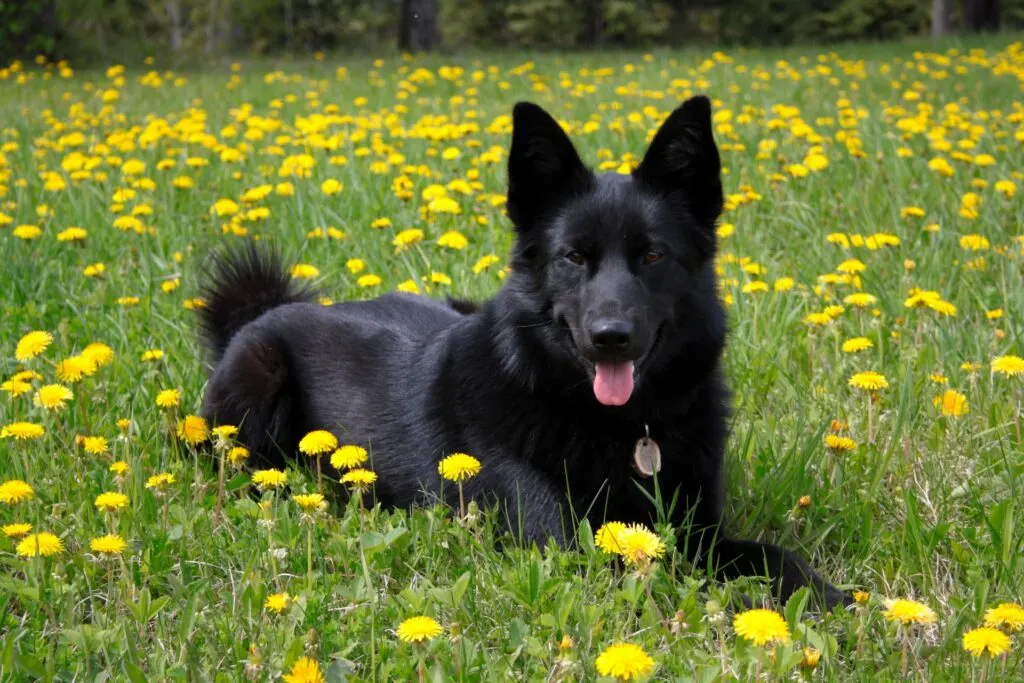
Adopting a Black German Shepherd Puppy
Adopting a Black German Shepherd puppy can be a rewarding experience. Various rescue organizations and shelters specialize in German Shepherd breeds, including Black German Shepherd puppies.
By adopting a GSD puppy, you provide a loving home to a dog in need and potentially save a life. However, before making such a significant commitment, consider your lifestyle and living situation to determine if it’s the right breed for you.
Buying a Black German Shepherd
If you prefer to buy a Black German Shepherd from a reputable breeder, remember to do thorough research. Look for breeders who prioritize the health and well-being of their dogs, conduct health checks, and provide appropriate documentation.
Meeting the breeder, observing the puppy’s living conditions, and asking questions about lineage and genetic health are good practices to follow. This way, you can guarantee you are getting a healthy and well-raised Black German Shepherd.
Black German Shepherd Mixes
Besides purebred Black German Shepherds, you can also find other German Shepherd mixes that combine the traits of different breeds.
Some of the most well-known mixed breeds of German Shepherd include the Isabella German Shepherd, the White Swiss Shepherd, and the King Shepherd. These mixed-breed dogs can result in unique and wonderful companions.
Nevertheless, it’s important to research and understand the characteristics of the other breed in the mix to ensure compatibility with your lifestyle and preferences.
Tips for Owning a Black German Shepherd
The Black Coat
The black coat of a German Shepherd requires special care and attention. Schedule regular grooming sessions, including brushing and checking for any skin issues.
Additionally, be mindful of exposing your Black German Shepherd to hot temperatures, as the black coat can absorb more heat than lighter-colored coats.
The Intelligence of Black German Shepherds
Black German Shepherds are incredibly intelligent dogs and thrive on mental stimulation. Perfect dog exercises to engage their minds include interactive games, puzzle toys, and obedience training. These activities will help your German Shepherd dog stay sharp and healthy.
Socializing and Training Your Black German Shepherd
Socialization is another component of caring for Black GSDs to ensure they grow into well-rounded and confident dogs.
Don’t be afraid to expose them to various environments, people, and other animals from a young age. It will prevent fear or aggression issues.
Consistent training with positive reinforcement techniques will also foster good behavior and a strong bond with your Black German Shepherd.
Final Thoughts
Black German Shepherds are a unique variant of one of the most popular large-breed dogs. Much like their more standard counterparts, they are known to be extremely loyal, affectionate, and trainable.
They make excellent working dogs but even better companions for families.
Yet, as a large breed dog, they have special needs. Your duty as a responsible pet owner is to understand and address them.
Providing your dog with proper nutrition, regular exercise, and ample love and affection will ensure they lead a healthy and happy life.
With consistent training, grooming, and regular visits to the veterinarian, you can forge a strong bond with your four-legged friend, filling your journey together with joy, companionship, and cherished memories.
Frequently Asked Questions
Are black German Shepherds rare?
While black German Shepherds are less common than their black-and-tan German Shepherd counterparts, they are not considered rare. The black gene is recessive, so it requires two black German Shepherds to produce black puppies. However, they are still widely available and can be found through reputable breeders or adoption.
Are Black German Shepherds easy to train?
Black German Shepherds are known for their intelligence and willingness to please their owners. This factor makes them relatively easy to train. They can quickly learn commands and various tasks with consistent and positive reinforcement training methods.
How are German Shepherds born black?
German Shepherds are born with a black color because they inherit genes that give them black fur from their parents. Some black German Shepherds may develop other coat colors or markings as they grow. Still, their initial appearance is entirely black due to their genetic makeup.


























